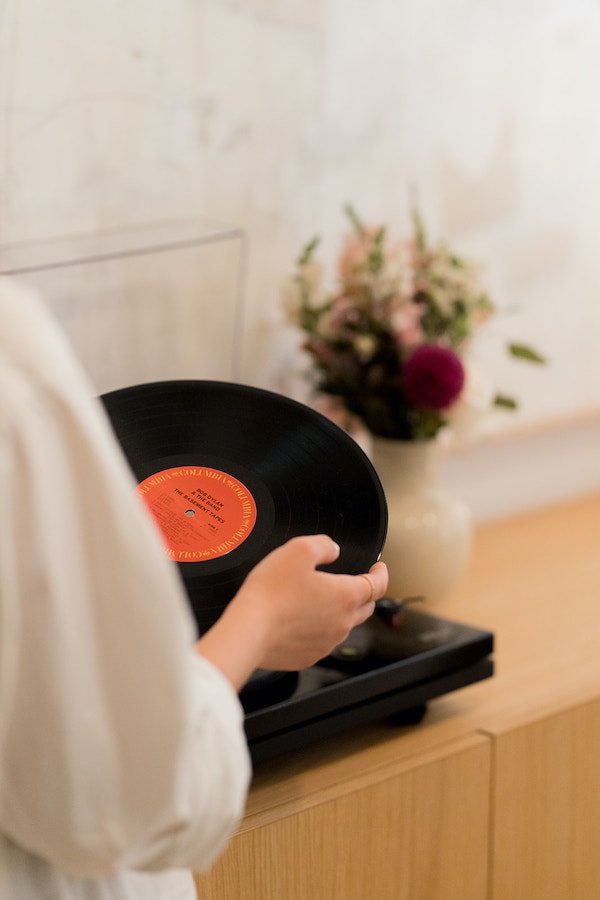
Sick of Swiping? Here’s How To Maintain Your Composure On Dating Apps
Dating apps are a merry-go-round of possibility and overwhelm. And most of us are nauseated from the spinning. Whether you’re looking for long-term love or a casual hookup, connecting with a cutie isn’t as easy as it’s marketed to be. More often than not, these platforms instead feel like a pill we need to swallow if we’re seeking romance in the modern jungle of singleness.
So we download. We give it a go, burn out, delete, redownload a few months later, and the cycle continues.
“I knew there had to be a way to reframe love online and engage the process without sacrificing my internal sense of balance.”
I’ve done my time in the trenches with the usual suspects of Hinge, Bumble, Coffee Meets Bagel, and a slew of others with nothing more to show for it than a few short-term flings, a tally of subpar first dates, and calluses on my thumbs from endless messaging.
Going into it, I knew this synthetic method of dating was not designed for my peak mental and emotional health. But when meeting people in real life is a whole other mountain to climb, I couldn’t turn my nose up at the convenience and utility these digital tools offer. However, I knew there had to be a way to reframe love online and engage the process without sacrificing my internal sense of balance.
If you’re with me in giving the apps a go, here are three guiding lights to help you maintain your sanity as you swipe:
Rehumanize the process
Picture this: you collapse onto the couch after a long day of work. You need a quick break before you whip up dinner. You open your phone to have a look at a few profiles. Immediately you bypass the first few options with condemning swipes to the left. These curated details of someone’s “love resume”—their interests, hobbies, and the best photos they have to offer–are all dismissed in an instant.
It’s as easy as swatting away a fly.
One key to remaining grounded in your dating app journey is to rehumanize the process of searching for love online.
“I intentionally began to remind myself there was a beating heart on the other side of every profile.”
Matthew Hussey, dating expert and author of Get the Guy, offers these words of caution to a fed-up online dater, “I want to be very careful about divorcing real life from the online life because I think it’s that kind of psychology is what makes us treat online dating like it’s a videogame and real life like it’s this big scary thing. The problem is, is that the process of online dating and apps dehumanize people.”
When I first dipped my toes into the apps, I struggled with how they forced me to judge people’s limited, 2D representations of themselves. The mindset of swiping and the habit of taking only milliseconds to develop a whole idea about a person began to bleed into my face-to-face interactions and the everyday souls I came across.
Once I intentionally began to remind myself there was a beating heart on the other side of every profile, I no longer brushed past potentially decent matches. I realized if I couldn’t be bothered to give each profile a fair look, I ran the risk of missing the point entirely: connecting with a dynamic human being.
We may not be dazzled at first glance. However, to keep a grip on our sanity in this virtual matchmaking, we must see the human beyond the photos and our snap judgments—just as we hope they’ll do when coming across our profiles.
Put a spin on messaging
Say you have a handful of hopeful dates in your inbox. Now comes the dreaded messaging phase. Unfortunately, many chats read as follows:
So how was your weekend?
It was good. How was yours?
Not bad. Just relaxed.
Sounds great. Busy week ahead?
Yeah, super busy! How about you?
Yeah, got a lot going on.
Yeah…
How is anyone supposed to fall in love when a conversation with your accountant is more invigorating than this? Switching up our approach to messaging will help make the back-and-forth bearable and hopefully, even enjoyable.
Take this pointer from the creator of Science of People, Vanessa Van Edwards, when she writes in her book Captivate: The Science of Succeeding with People: “We stick to social scripts out of habit. The best conversations have specific jolts of energy and excitement.”
Consider how it would feel to receive one of these messages on a dating app:
Okay, you have to tell me—what was the last movie you cried to?
The highlight and lowlight of your week so far. Go!
Here’s a scenario: You’re surprised with a Sunday free of plans. What do you do with it?
I’ve learned that half the battle of the early stages of dating is learning how to create an interaction that keeps both parties engaged.
“This lighthearted question gave me a window into who my matches were much quicker than generic conversation starters.”
I recently messaged my handful of matches: “I’m curious. What game show do you feel confident you’d win?” and received entertaining replies like, “I’ve been training for Family Feud my whole life. I’m winning that Ford Fusion no matter what.” Or another read, “I watch Wheel of Fortune with my grandma when I visit her every week, but I know stage fright would get the best of me, and I’d forget how to spell the moment I was up there.”
This lighthearted question gave me a window into who my matches were much quicker than generic conversation starters. In the same way, Van Edwards encourages her readers to think outside the box regarding how they begin interactions, divulging a meaty list of 57 ideas to get us started.
Asking off-the-wall questions can liven up the dullness of the messaging phase and zest up our inboxes, making them something we look forward to opening.
Learn how to stomach ghosting
If you’re unfamiliar with the term, “ghosting” refers to the sudden disappearance of a relationship. On dating apps, this looks like a user who loses interest and lets their silence communicate it. Ghosters suddenly don’t answer messages or calls and seemingly fall off the grid. They vanish, and you’re left with zero explanation and zero closure. It’s a common experience but not an easy one to endure.
Being ghosted can send us into the spiral of: “Why did they pull away? What did I do? How can I fix it?” But to keep our peace while online love-seeking, we must learn how to reframe the experience of being ghosted.
While not every stage of the online dating process requires a direct conversation, understand that when a connection is at a point where the disappearance stings, ghosting says much more about the ghoster than the ghosted.
Organizational psychologist Adam Grant notes “Ghosting is cowardice plus selfishness. It protects them from awkwardness and deprives you of closure. Silence doesn’t avoid conflict. It offloads it onto the person who’s ghosted.”
“Ghosting is cowardice plus selfishness. It protects them from awkwardness and deprives you of closure. Silence doesn’t avoid conflict. It offloads it onto the person who’s ghosted.”
– Adam Grant
How can we reframe this pain?
One key I found is shifting my perspective to be thankful that this user showed their true colors sooner rather than later. It’s not easy rejecting someone; however, ambiguity and silence are inadequate tools for kind communication. People are demonstrating who they are one hundred percent of the time. It’s better to recognize a dater’s unwillingness to have a difficult conversation now than months or years later.
If you find yourself sitting on unanswered messages, practice seeing the ghoster’s disappearing act as a helpful indication that they lack the tools to participate in a mature relationship. Count yourself lucky.
Godspeed on your swiping
Learning when to pause the pursuit of love online is equally as important as engaging in it. Dating apps won’t be a fit for everyone at every stage of life, and taking a step away is the ball that forever remains in your court. Tools, however unconventional, should always add to your life rather than burden it.
In all, dating apps are a circus, and while they may feel like a necessary evil, there are ways to maintain our peace and sanity within the swirl of their chaos.
As we rehumanize the process, spark a connection with dynamic questions, and reframe the disappointment when things fizzle out, we can wield the apps as the tools they’re meant to be—and we can keep our peace while doing it.
Cheyanne Solis is a writer from California. When she’s not planning weddings or acting like a grandpa by bird-watching in the park with a copy of the Sunday Times, she is falling into fascination about the human experience, working to write words to wrap around it all.



